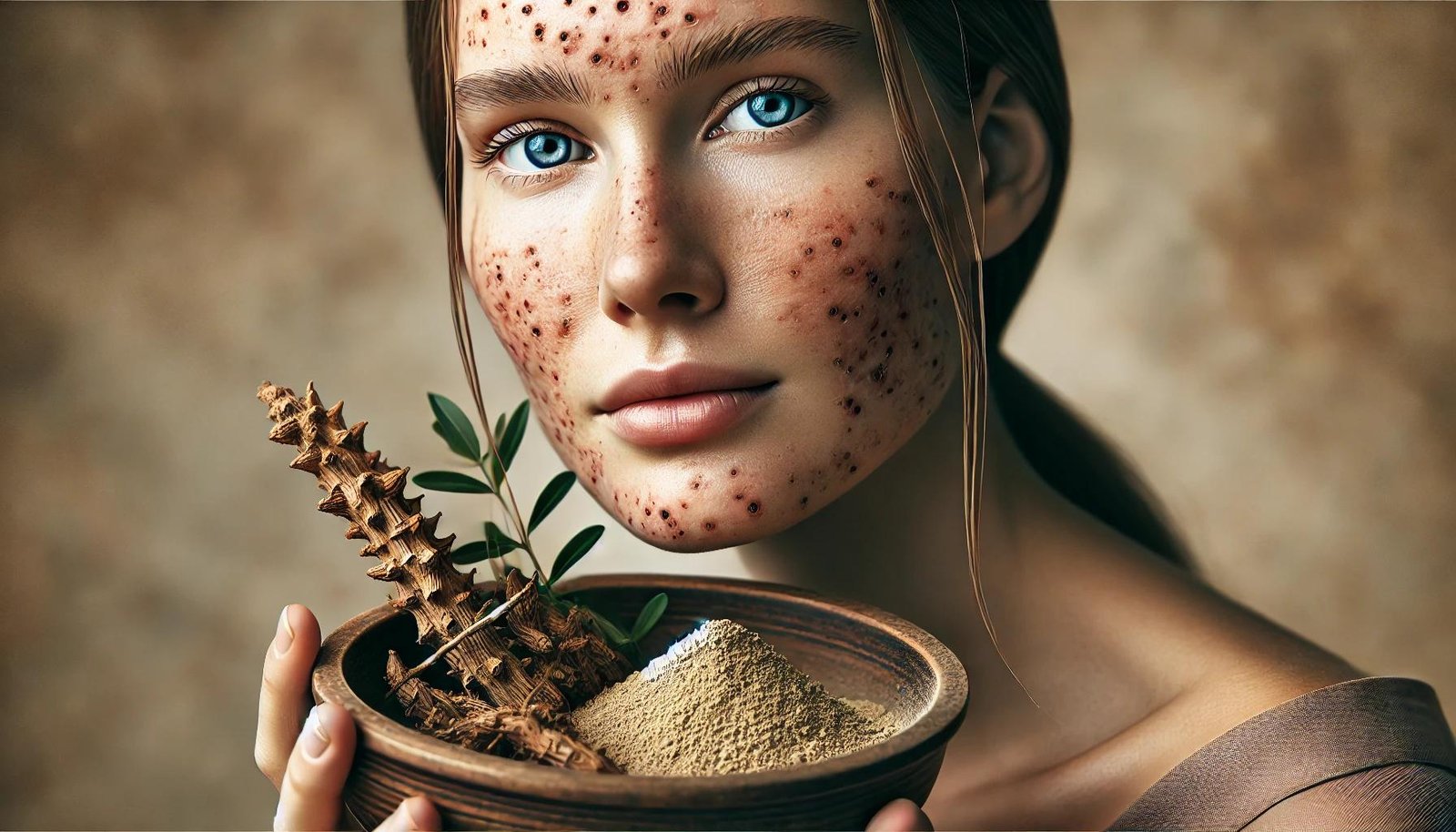Ashwagandha (Withania somnifera) is an ancient herb prescribed by Ayurveda, the traditional medicine of India. It has had long use as a general remedy and tonic for stress reduction, immune support, improved mental acuity. But do you know, Can ashwagandha cause acne? This article looks into the possible relationship between ashwagandha and skin health – from science, to anecdotes, to some good old advice.
The Origins of Ashwagandha
Ashwagandha is an herb that comes from the Indian subcontinent and parts of Africa, its scientific name is Withania somnifera. For thousands of years, Ayurvedic medicine has used its roots and berries. The word ashwagandha translates to “smell of the horse,” due to its unique smell and also because it is believed that the herb gives a person the strength and vigor of a stallion.
In Ayurvedic practice, ashwagandha is classified as a Rasayana, which means it is believed to promote longevity and vitality. Ancient texts describe it as a tonic that enhances overall health, improves energy levels, and strengthens the immune system. Traditional uses include:
- Stress Management: Ashwagandha has gained notoriety for its natural properties against Stress and Anxiety, largely from its cortisol level lowering attributes.
- Enhanced Cognitive Function: Certain research indicate that ashwagandha can promote memory, learning skills and cognitive well-being.
- Physical Performance: Ashwagandha benefits are seen with increased physical performance, and decreased athletic fatigue.
To explore the traditional applications of ashwagandha further, you can refer to NCCIH.
Read more: Does Smoking Weed Cause Acne? Causes & Clear Skin Solutions
Can Ashwagandha Cause Acne?
However, ashwagandha and acne are not directly related. In general, there is nothing concrete that says ashwagandha creates or reduces acne, thus it may cause some people to suffer more from breakouts while others feel like it works wonders for their skin. The experiences varying so much does imply ashwagandha can have side effects but its likely because of hormone levels and skin type.
Understanding Acne
Before we explore possible mechanisms of how ashwagandha could affect acne, it is important to understand how acne forms. Acne develops when the oil, dead skin cells and bacteria block sinuses. Increase in the production of androgens (male hormones) during puberty leads to increased secretion of oils that contribute to acne.
Common Uses of Ashwagandha in Traditional Medicine
Ashwagandha is primarily celebrated for its adaptogenic properties, which allow it to help the body adapt to stress and promote overall wellness. Common uses in traditional medicine include:
- Stress Reduction: Research indicates that ashwagandha can lower cortisol levels, helping the body manage stress effectively. High cortisol levels can lead to various health issues, including skin problems.
- Anxiety and Depression Relief: Some studies suggest that ashwagandha may help alleviate symptoms of anxiety and depression, contributing to improved mental health.
- Improved Sleep Quality: Ashwagandha is known to promote relaxation and improve sleep quality, which is crucial for skin health. Lack of sleep can exacerbate acne and other skin issues.
- Immune System Support: By enhancing immune function, ashwagandha can help the body fend off infections, including those that can contribute to acne.
- Hormonal Balance: Some evidence suggests that ashwagandha may help regulate hormonal levels, which can impact skin health.
For a comprehensive overview of ashwagandha’s health benefits, check out Healthline.
Read more: 10 Best Home Remedies for Clear Skin
The Connection Between Ashwagandha and Acne
Adaptogenic ashwagandha may prove helpful for stress-induced acne, but hormonal effects should be taken into account. But some users have experienced more acne breakouts, which has raised concerns about the effects of the herb on hormonal levels.
Hormonal Imbalance and Acne
Another reason could be because you are going through hormonal imbalances that cause acne to appear. Higher levels of androgens, which can be due to stress, diet or hormonal changes can increase oil production and clog pores.
- Cortisol Levels: Ashwagandha is known for its ability to lower cortisol levels. However, in some individuals, the sudden reduction in stress may lead to a temporary hormonal adjustment that could contribute to acne breakouts.
- Testosterone and Androgens: Ashwagandha may influence testosterone levels, and while this can be beneficial for some, an increase in androgens may exacerbate acne in others. Monitoring hormone levels through blood tests can provide insight into how ashwagandha may affect you personally.
How Ashwagandha Might Affect Your Skin
The effects of ashwagandha on skin health can be attributed to its active compounds, particularly withanolides. These compounds possess anti-inflammatory, antioxidant, and antimicrobial properties. Here’s how ashwagandha might impact your skin:
- Anti-Inflammatory Effects: The anti-inflammatory properties of ashwagandha can help reduce redness and irritation associated with acne.
- Antioxidant Protection: Withanolides can combat oxidative stress, which may protect skin cells from damage and promote a healthier complexion.
- Regulation of Oil Production: While some users may experience increased oiliness, others may find that ashwagandha helps regulate sebum production, potentially leading to clearer skin.
- Healing Properties: Ashwagandha’s antimicrobial properties can help combat acne-causing bacteria, promoting faster healing of existing breakouts.
The Role of Hormones and Ashwagandha
Skin health is very reliant on hormones. Acne flares in response to hormonal changes are common during puberty, menstruation and whenever under stress. It is very important to know the hormonal contra effects of ashwagandha for those who have acne skin prone.
Cortisol and Stress Response
Increased cortisol that comes along with chronic stress may make a contribution to skin problems like acne. This stress hormone balancing characteristics of Ashwagandha might help those who have acne due to the tension. Nevertheless, one should watch for how they react to this herb.
Testosterone and Androgens
As previously mentioned, ashwagandha may boost testosterone. Sometimes, this influence can result in higher androgen levels which make acne worse. For those who have Hormonal Acne, it is better to consult with a doctor prior taking Ashwagandha.
Other Potential Side Effects and Precautions of Ashwagandha
Ashwagandha can be safe for most people, but there are potential side effects. Here are a few to consider:
- Gastrointestinal Upset: Some users report stomach discomfort, diarrhea, or nausea when taking ashwagandha. Taking it with food may help mitigate these effects.
- Insomnia or Restlessness: Although ashwagandha is known for its calming effects, a small percentage of users may experience insomnia or restlessness.
- Mood Changes: While many people find that ashwagandha improves mood, others may experience fluctuations.
- Allergic Reactions: Ashwagandha may cause symptoms of allergy such as skin rashes if used by people allergic to it. Discontinue use if you experience any adverse reactions and consult a healthcare professional.
Precautions When Using Ashwagandha
While ashwagandha is safe for many, it is essential to follow precautions:
- Consult a Healthcare Provider: Before Starting Ashwagandha, Ask a Healthcare Provider: If you are pregnant or breastfeeding, consult with your healthcare provider before taking ashwaganda.
- Adhere to Recommended Dosage: Consuming excessive amounts of ashwagandha can increase your chances of experiencing side effects. Take as directed on the label, or consult with an expert healthcare provider if you have any doubts.
- Monitor Skin Reactions: Check to see how your skin reacts with ashwagandha. If you see more acne or adverse side effects, stop using it and consult a dermatologist.
- Choose Quality Products: Choose products made with high-quality ashwagandha from trusted suppliers to ensure that you are getting a pure product which is effective.
Read more: Sonrei Growth Factor Sunscreen: The Secret to Youthful Skin?
Frequently Asked Questions (FAQ)
1. Can Ashwagandha Cause Acne?
Ashwagandha can help to combat stress, removing one possible cause of acne in certain individuals, but others have reported developing breakouts due to ashwagandha. Skin reactions can be different for each person, it is important to observe what your skin responds well too.
2. Ashwagandha Acne Before and After
According to some users, ashwagandha has helped improve the quality of their skin through minimizing stress and inflammation for clearer complexion. Of course, some will see an immediate breakout before they start to notice the great effects.
3. Ashwagandha Cleared My Acne
A few people have reported that ashwagandha had eradicated their acne, especially when they noticed an improvement in stress. May provide healthier skin for some users with consistent use.
4. Can Ashwagandha Cause Weight Gain?
However, it is not like the ashwagandha causes weight gain independently. It may not be so in other individual but it helps prevent stress-related weight gain, by lowering both the level of stress and cortisol.
5. Can Ashwagandha Reduce Acne?
Yes, ashwagandha may help reduce acne for some people due to its anti-inflammatory and stress-reducing properties. Individual results can vary, so it may not work for everyone.
6. Can Ashwagandha Cause Anxiety?
While ashwagandha is generally known for reducing anxiety, a small number of users may experience heightened anxiety or restlessness. If this occurs, discontinuing use and consulting a healthcare provider is advisable.
7. Can Ashwagandha Cause Hair Loss?
For the most part, there is little evidence assocating ashwagandha with hair loss. Actually, some studies also suggest that it may certainly aid in hair growth benefits being an adaptogen.
8. Can Ashwagandha Cause Depression?
Ashwagandha is primarily used to alleviate symptoms of anxiety and depression. However, some individuals may experience mood swings or fluctuations. It’s important to monitor your mental health and consult a professional if needed.
9. Does Ashwagandha Cause Breakouts?
While it can help manage stress-related breakouts, some users report that ashwagandha may cause initial breakouts due to hormonal fluctuations. Individual experiences may vary.
10. Can Ashwagandha Cause Skin Problems?
Generally, ashwagandha is safe for most individuals. However, some may experience allergic reactions or sensitivity, leading to skin problems. If any adverse reactions occur, consult a healthcare professional.
11. Does Ashwagandha Affect the Face?
And on the facial skin maybe? By lowering stress and inflammation, ashwagandha could have a positive impact. Users may experience better skin and appearance, but results will vary.
Conclusion: Can Ashwagandha Cause Acne?
Overall, despite the many health benefits of ashwagandha we cannot categorically say it may offer any effects on acne. Ashwagandha : Some may notice lower stress levels and improved skin while others can experience more breakouts due to the fluctuations in hormones. Of course, as with any supplement be sure to monitor how your body reacts and consult a healthcare provider if you have concerns. So, knowing the complicated dynamic of ashwagandha for skin health become crucial to take wiser decisions.
Read more: Raw Shea Butter: Health Benefits and Natural Skincare Miracle
References
- National Center for Complementary and Integrative Health. (2021). Ashwagandha: In Depth.
- WebMD. (2021). Ashwagandha Overview.

